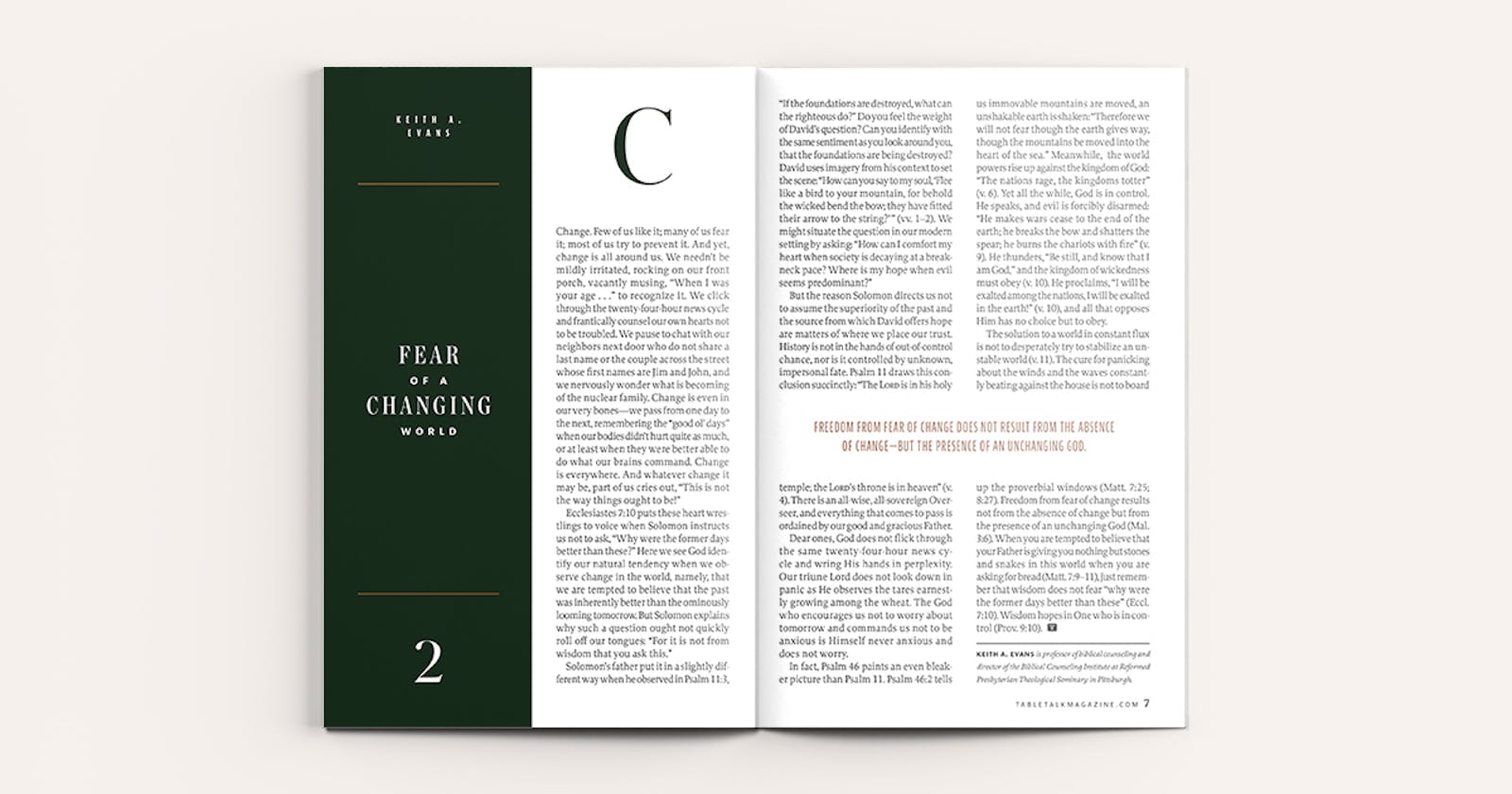
Request your free, three-month trial to Tabletalk magazine. You’ll receive the print issue monthly and gain immediate digital access to decades of archives. This trial is risk-free. No credit card required.
Try Tabletalk NowAlready receive Tabletalk magazine every month?
Verify your email address to gain unlimited access.
Change. Few of us like it; many of us fear it; most of us try to prevent it. And yet, change is all around us. We needn’t be mildly irritated, rocking on our front porch, vacantly musing, “When I was your age . . .” to recognize it. We click through the twenty-four-hour news cycle and frantically counsel our own hearts not to be troubled. We pause to chat with our neighbors next door who do not share a last name or the couple across the street whose first names are Jim and John, and we nervously wonder what is becoming of the nuclear family. Change is even in our very bones—we pass from one day to the next, remembering the “good ol’ days” when our bodies didn’t hurt quite as much, or at least when they were better able to do what our brains command. Change is everywhere. And whatever change it may be, part of us cries out, “This is not the way things ought to be!”
Ecclesiastes 7:10 puts these heart wrestlings to voice when Solomon instructs us not to ask, “Why were the former days better than these?” Here we see God identify our natural tendency when we observe change in the world, namely, that we are tempted to believe that the past was inherently better than the ominously looming tomorrow. But Solomon explains why such a question ought not quickly roll off our tongues: “For it is not from wisdom that you ask this.”
Solomon’s father put it in a slightly different way when he observed in Psalm 11:3, “If the foundations are destroyed, what can the righteous do?” Do you feel the weight of David’s question? Can you identify with the same sentiment as you look around you, that the foundations are being destroyed? David uses imagery from his context to set the scene: “How can you say to my soul, ‘Flee like a bird to your mountain, for behold the wicked bend the bow; they have fitted their arrow to the string?’ ” (vv. 1–2). We might situate the question in our modern setting by asking: “How can I comfort my heart when society is decaying at a breakneck pace? Where is my hope when evil seems predominant?”
But the reason Solomon directs us not to assume the superiority of the past and the source from which David offers hope are matters of where we place our trust. History is not in the hands of out-of-control chance, nor is it controlled by unknown, impersonal fate. Psalm 11 draws this conclusion succinctly: “The LORD is in his holy temple; the LORD’s throne is in heaven” (v. 4). There is an all-wise, all-sovereign Overseer, and everything that comes to pass is ordained by our good and gracious Father.

Dear ones, God does not flick through the same twenty-four-hour news cycle and wring His hands in perplexity. Our triune Lord does not look down in panic as He observes the tares earnestly growing among the wheat. The God who encourages us not to worry about tomorrow and commands us not to be anxious is Himself never anxious and does not worry.
In fact, Psalm 46 paints an even bleaker picture than Psalm 11. Psalm 46:2 tells us immovable mountains are moved, an unshakable earth is shaken: “Therefore we will not fear though the earth gives way, though the mountains be moved into the heart of the sea.” Meanwhile, the world powers rise up against the kingdom of God: “The nations rage, the kingdoms totter” (v. 6). Yet all the while, God is in control. He speaks, and evil is forcibly disarmed: “He makes wars cease to the end of the earth; he breaks the bow and shatters the spear; he burns the chariots with fire” (v. 9). He thunders, “Be still, and know that I am God,” and the kingdom of wickedness must obey (v. 10). He proclaims, “I will be exalted among the nations, I will be exalted in the earth!” (v. 10), and all that opposes Him has no choice but to obey.
The solution to a world in constant flux is not to desperately try to stabilize an unstable world (v. 11). The cure for panicking about the winds and the waves constantly beating against the house is not to board up the proverbial windows (Matt. 7:25; 8:27). Freedom from fear of change results not from the absence of change but from the presence of an unchanging God (Mal. 3:6). When you are tempted to believe that your Father is giving you nothing but stones and snakes in this world when you are asking for bread (Matt. 7:9–11), just remember that wisdom does not fear “why were the former days better than these” (Eccl. 7:10). Wisdom hopes in One who is in control (Prov. 9:10).
